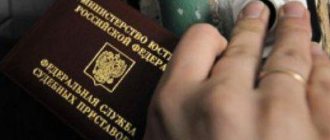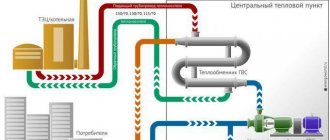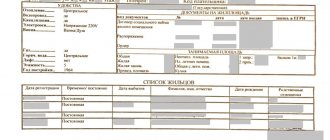12
Since an apartment is a divisible piece of real estate, then, in accordance with the provisions of the Law, it is impossible to name the smallest share that there may be. Very small shares usually appear when several relatives inherit an inheritance or when concluding a donation agreement for housing shares. But are the concepts of “insignificant” and “small in area” shares identical? This, as well as how to recognize the share as insignificant, will be discussed in our article.
What is a minor share
In modern Russian legislation, the concept of “minor share” is not only used, but is also the basis for the forced purchase of part of a residential premises. However, the size of such a share is not defined in the current regulations.
Thus, the legislator points out the obligation of the courts, when deciding on the insignificance of the property area, to consider each specific case individually.
Moreover, it is not only the area that influences the recognition of a share as insignificant. So, it may be even less than the living standards per person in a particular region.
However, under certain circumstances, it cannot be considered insignificant and subject to compulsory redemption.
But it is precisely the desire of the owner of most of the housing to buy it out completely that is the reason for turning to the justice authorities. Indeed, such a possibility is provided for by the norm of Art. 252 of the Civil Code of the Russian Federation.
It is possible to carry out a transaction to alienate a tiny share in only two ways:
- By mutual agreement. In this case, the parties themselves decide which form of agreement to choose (purchase agreement, deed of gift, exchange, etc.). It must be remembered that from 2021, all transactions made with part of the housing are subject to mandatory registration with a notary (Federal Law No. 122 “On state registration of rights to real estate and transactions with it”).
- By the tribunal's decision. Usually, the need to contact the justice authorities arises if the co-owners cannot agree on the value of the share or on the procedure for using the apartment. Only a court can recognize part of the housing as an insignificant share and oblige the remaining owners to buy it back.
New law of shared ownership
Back in 2021, the first reading was adopted by a law that should regulate the size of the minimum share, as well as the rights and obligations that arise from it. This should only apply to moments of purchase and sale or donation, but not to privatization or inheritance. As of the date of writing this article, the law has still not been adopted and it is not yet clear when it will be adopted, as well as what exactly will be written in it.
What share in an apartment can be considered insignificant?
In order for a share in a residential property to be considered insignificant, a court decision is required. After all, if the co-owners of the property come to mutual agreement, then it does not matter whether the alienated part of the apartment is tiny or, on the contrary, significant.
An insignificant share can be recognized only if three certain conditions are met at once:
| Condition | Note |
| Evasion of the owner of the share from its management and maintenance, lack of need for this particular housing | If the owner of part of the apartment does not participate in its renovation (financially or physically), does not pay utility bills, does not respond to offers to buy it out, exchange it, etc., actually lives in another place, has a full-fledged real estate, where he lives permanently. This point is the most difficult to prove. |
| Small size (percentage) | If one of the co-owners owns, for example, 1/16 of a one-room apartment with an area of 30 sq.m., and the second 15/16, then it is natural that the use of housing by the first owner will infringe on the rights of the second. Since in fact the first one will be able to claim only 1,875 sq.m of the property. |
| Inability to allocate a natural share of the total area | Allocation of part of the housing in kind implies the actual transformation of one property into two independent ones. That is, it is necessary to have two separate entrances, communications, personal accounts, etc. |
If all these three conditions are not met together, then the share in the apartment, despite its small area, cannot be considered insignificant.
For accommodation
The desire not only to register, but to live in an apartment, presupposes a minimum share in the property. The calculation is carried out depending on the size of the apartment:
- 4-room or 3-room – at least ¼ of the share in the common law (room);
- 2-room – ½ apartment ;
- 1-room, studio or small family - entirely (with the exception of spouses, parents and children).
Expert opinion
Makarov Igor Tarasovich
Legal consultant with 8 years of experience. Specialization: criminal law. Extensive experience in document examination.
The minimum allowable standard for one person to live is 6 m². This area is allocated in dormitories, service apartments and flexible housing.
Procedure for recognizing a minor share in an apartment
In order for the court to recognize the share of housing as insignificant, it is necessary to follow a certain procedure and procedure.
Procedure
Going to court requires compliance with certain rules:
- An attempt to resolve the dispute out of court. This stage is not mandatory, however, it is the presence of notification to the co-owner of the desire to buy out his share that will play in your favor during the trial. And if your opponent satisfies your desire and voluntarily sells part of the apartment, then the need to contact the justice authorities will disappear by itself.
- Collection of evidence. The courts consider documentary evidence to be the most significant. Therefore, it is worth thinking in advance about what certificates can support your claims. These can be receipts for payment of utilities personally by you, and an apartment card, according to which only you are registered, certificates of major repairs of the premises at your expense (estimates, receipts, etc.), an extract from the Unified State Register of Real Estate about the presence of the defendant other housing and so on.
- Drawing up an application. This main document initiating the legal procedure is drawn up in accordance with the requirements of Art. Art. 131, 132 Code of Civil Procedure of the Russian Federation. A sample of it can be downloaded from our website below, but it is worth considering that each situation is individual. It is best to entrust writing a claim to a professional lawyer.
- Participation in litigation. If you can try to draw up a statement of claim yourself, then at this stage the participation of a professional lawyer specializing in real estate disputes becomes necessary. The issues of recognizing a share as insignificant and its forced redemption are quite complex, because it affects the rights of citizens to the inviolability of personal property, which are especially protected by the State (Article 35 of the Russian Constitution).
- Adjudication. After hearing all sides of the dispute and carefully considering all the evidence, the judge makes his decision. It can be both in your favor and in favor of the defendant. But if you do not agree with it, then you must file an appeal to a higher authority (up to the Supreme Court of the Russian Federation).
- Entry into ownership. After a court decision is made that satisfies your requirements, compensation for the forced alienation of the share is paid (established by the court), you must contact the registration authorities (Rosreestr or any branch of the MFC). There, an application of the established form is drawn up (the form will be provided by the institution’s employees). Then changes are made to the Unified State Register and you can receive an extract of ownership.
At this point, the procedure for recognizing the share as insignificant and compulsory redemption can be considered completed. However, it is worth remembering that the defendant also has the opportunity to appeal the court’s decision and must wait until the decision enters into legal force before applying to Rosreestr.
Required documents
Before filing a claim to recognize part of the apartment as insignificant, it is best to collect all the documents. This is what will help you get a complete picture and write a statement of claim as completely and correctly as possible.
When sending the claim to court, you must attach the following required documents:
- plaintiff's civil passport;
- an extract from the house register, an apartment card;
- evidence of payment of state duty (receipt);
- evaluation report;
- technical documents for the property;
- other evidence of the validity of the claims specified in the application;
- documentary evidence of attempts to resolve the dispute out of court.
In order for the court to satisfy the claim, the applicant must deposit with the court an amount equal to the value of the insignificant share. To determine the cost, it is necessary to conduct a market assessment of the apartment and its share, in particular.
Important! Often, to reduce costs, the plaintiff uses the cadastral value. If the difference between the market and cadastral value is significant, the defendant may request an examination. In order to speed up the process, it is advisable to contact the appraisal organization yourself.
Assessment requirements:
- the company must have a license to carry out this type of work;
- the appraiser must be a member of the SRO;
- the assessment report must be in writing.
Based on the assessment results, the state duty to the court is calculated.
Statement of claim
When drawing up an application, you must pay attention to the fact that it must contain the following information:
- plaintiff's details;
- the most accurate information about the defendant;
- a third party (usually in such disputes it is the regional branch of Rosreestr);
- the name of the judicial body to which the claim is sent;
- cost of claim;
- title of the application (“statement of claim for recognizing the share as insignificant and paying its owner monetary compensation instead of allocating the share”);
- the circumstances of the emergence of the right of ownership of all shares by all co-owners;
- reasons for going to court;
- information about the results of pre-trial settlement (if any);
- requirements for consideration;
- justification of requirements with references to the norms of current legislation;
- date of compilation, signature of the plaintiff.
The application is copied in a number of copies that is a multiple of the parties to the trial, that is, the judge, the plaintiff and each of the defendants must have the statements of claim and a complete set of copies of the attached documents.
Expenses
When deciding on the forced purchase of part of the residential premises, you will have to incur costs not only for its acquisition.
So, when going to court, you will have to pay a state fee, the amount of which is determined in Art. 333.19 of the Tax Code of Russia and depends on the value of the disputed share of housing. It cannot be less than 400 rubles. The maximum amount is limited to 60,000 rubles.
When registering a share in property, you will also have to pay the cost of registrar services established by the State - 2000 rubles.
The costs that you incur for conducting an appraisal of the value of the home, as well as for paying a lawyer, can be classified as legal costs and recovered from the defendant, but only if a decision is made in your favor.
Deadlines
It takes at least 2 months to consider a claim to recognize part of the housing as an insignificant share. However, in practice these deadlines can extend significantly.
Everything depends not only on the positions of each party, but also on the timing of additional examinations, the timing of appeals, the appearance of interested parties in court, etc.
Upon receipt of a decision that has entered into force, registration with the Rosreestr authorities should not take more than 14 working days.
Arbitrage practice
The practice that has developed in Russian courts regarding the consideration of cases on recognition of a share as insignificant is quite ambiguous.
Most often, the Supreme Court puts the last point. Even in seemingly identical situations, the decision can be diametrically opposed.
Example. During privatization, a two-room municipal apartment with an area of 43 sq.m. was acquired by mother and son, S.N. Romanova. And Romanov V.P. After some time, Romanova S.N. sold her half of the apartment to R.A. Kazantsev, since her son refused to buy out the share in accordance with the established procedure. Kazantsev, in turn, donated 1/3 of his share of the property to his wife I.N. Kazantseva. and adult son Kazantsev A.R. The Kazantsev family did not actually live in the apartment and were not against selling it, but for this they asked Romanov for an amount that was not commensurate with the real cost of the housing.
Then Romanov went to court demanding recognition of I.N. Kazantseva’s shares. and Kazantseva A.R. insignificant and subject to compulsory redemption. To substantiate his demands, Romanov cited evidence that the Kazantsevs did not actually live in the apartment and paid utility bills. The plaintiff also presented a conclusion from a specialist assessing the value of real estate (shares). The plaintiff was denied in the trial court. However, the regional court, and then the Supreme Court of the Russian Federation (on the defendants' appeal) sided with Romanov. He was able to forcibly buy out the shares of the apartment.









